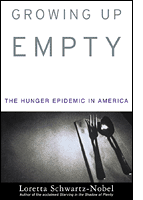
Most Americans may find it hard to accept that millions in this nation are suffering from hunger — an affliction most often associated with war-torn Africa or flood-ravaged Bengal. It flies in the face of everything we’ve been told about our nation’s prosperity. First the Clinton and then the Bush administration have led us to believe that poverty is under control, pointing to the mass exodus from the welfare rolls since the 1996 reforms were launched. The $27 billion cut in food stamps? Justified, lawmakers told us, because the poor are working and feeding themselves. Hunger, it is commonly understood, has long since vanished, along with the 7 million people who no longer receive public assistance.
Yet recent U.S. Department of Agriculture statistics tell a more damning tale. A 1999 study showed that more than 36 million Americans — one-third of them children under the age of 12 — suffer from “limited or uncertain” access to food. In 1998, a food relief organization found that as many as 1 in 10 Americans had relied on soup kitchens and emergency food centers in order to eat.
In Growing Up Empty, Loretta Schwartz-Nobel sets out to put a human face on these and other statistics through vivid on-the-ground reporting. She witnesses children rummaging through a Philadelphia garbage can for half-eaten chicken legs. She opens the barren refrigerator of a Marine and his family in a Virginia training camp. She meets an angry rural Mississippi woman trying to feed her four children on $80 a month in food stamps. A North Philadelphia mother says she got so used to hunger that her “stomach ached like rubber bands was tied around it.” The result is a harrowing compendium of human stories that tumble into one urgent message: Hunger is a pervasive, hidden, and completely avoidable disease in the United States, a nation that wastes 27 percent of its food supply.
Rampant hunger is as difficult to reconcile with our national image today as it was more than a quarter century ago when Schwartz-Nobel first encountered it. In 1974, as a young reporter, she stopped on a Philadelphia street to help a crippled 84-year-old woman. She bought the woman a bag of groceries that day and would drop by with food from time to time. Several months later, Schwartz-Nobel came calling, only to find that the woman had died alone, of hunger. The wrenching experience led the author to discover that millions of other Americans were quietly starving. In 1981, the results of her reporting were published in the award-winning book Starving in the Shadow of Plenty.
In the years that followed, the Reagan administration cut $12 billion from the federal food program, and one of his advisers boasted that “poverty has been virtually wiped out in the United States.” Growing Up Empty turns that claim on its head. By all rights, our food coffers today should be far more bountiful. America is even more prosperous, and more than 140,000 food relief organizations exist today where there were only a few two decades ago. Yet hunger persists, and the reasons are a direct result of government policy. Welfare reforms shredded the financial safety net for the nation’s poor while simultaneously pushing low-income workers into poverty-level jobs with no access to food relief or health insurance. No wonder that last year the U.S. Council of Mayors reported that record numbers of the working poor were standing on lines to feed their families.
Perhaps the author’s most startling revelation is her exposé of deprivation among the nation’s enlisted soldiers. Salaries are so low ($887.70 a month in 2000 for a newly enlisted Marine) that even with food stamps, many military families find it hard to cobble together an existence. The director of a charity for enlisted families in San Diego tells of a soldier who bought 21 McDonald’s hamburgers when they were 39 cents apiece so that his pregnant wife would have something to eat while he was away on field duty. His wife ate one a day until he returned. Another young Marine admits that he is accustomed to going without meals for four days at a time when his family’s food stamps run out at the end of the month.
This is a book meant to stir outrage, and it is written from the heart. Some may be put off by the author’s sentimental asides when the facts are disturbing enough to speak for themselves. Others may find it troubling that she conceals the full identities of her subjects. But the powerful message cannot be ignored. A reader hears the rumbles of invisible Americans who don’t have enough to eat. The suffering is plentiful, like the nation’s resources.
LynNell Hancock is a professor at Columbia University’s Graduate School of Journalism and the author of Hands to Work: The Stories of Three Families Racing the Welfare Clock (William Morrow 2001).















